Contact Pacific Southwest Waste Program
Pacific Southwest, Region 9
Serving: Arizona, California, Hawaii, Nevada, Pacific Islands, Tribal Nations
Success Stories in Tribal Solid Waste

On This Page:
- Tribes Work to Improve after Major Solid and Hazardous Waste Clean-Ups
- La Jolla Band of Luiseño Indians Collect & Dispose of Waste
- Pit River's Path to Solid Waste Sustainability
- Redding Rancheria Closes Yard Dump
- Pinoleville Transforms Trash
- Fort Independence Reservation Reduces Waste by 26%
through Recycling - Torres Martinez Collaborative
- Hoopa Valley Tribe’s Blake Apparatus Helps Clean Up Open Dumps
Regional Coordination – Tribes Continue to Work to Improve Waste Management Practices after Major Solid and Hazardous Waste Clean-Ups

EPA Region 9 recently awarded $86,350 in Resource Conservation Fund (RCF) grants to the Yurok and Karuk Tribes in Northern California. The Tribes will use the grant funds to increase material reuse and recycling, and improve solid waste management practices on their lands.
Full tribal coordination story, with photos
La Jolla Band of Luiseño Indians Improving Collection and Disposal of Household Hazardous Waste

Last year, the La Jolla Band of Luiseño Indians was awarded two new grants from the EPA to assist in the further development and management of the Tribe’s transfer station. The Tribe received a 2009 Tribal Solid Waste Management Assistance Project Grant and a 2009 Hazardous Waste Management Grant from EPA. The Tribe currently operates a transfer station on their reservation located in Northern San Diego County, California.
Full Household Hazardous Waste story with video and photos
Pit River's Path to Solid Waste Sustainability
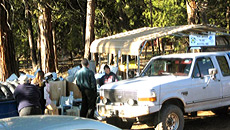
The Pit River Tribe has successfully brought solid waste and recycling collection to their tribal homes and businesses. Funded with a grant from USDA and EPA, the Pit River Tribe hired a solid waste coordinator and technician, purchased a collection vehicle and bins, and established the Pit River Solid Waste and Recycling service. The Tribe established a drop-off recycling center that accepts electronic waste, recyclables, and reusable materials; a car crushing operation; and a "pay-as-you-throw" collection program. In order to gain acceptance for the "pay-as-you-throw" program, the Tribe rolled program out slowly, starting it initially as a free service then gradually introducing fees. The Tribe also worked closely with their finance department to ensure proper accounting and billing. After two years of operation, the program has successfully overcome 100-mile haul distances to provide service to low-income rural tribal members who were previously not served. In order to bring the program closer to sustainability, the Tribe gained generous support from their Tribal Council, and found creative ways to generate additional program income by renting their collection vehicle and clean-up bins. This program provides tribal members with a consistent service, and open dumping and burning on the Tribe's land has been greatly reduced.
More Information
Redding Rancheria Closes Yard Dump
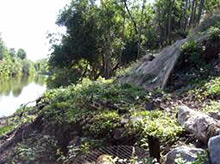
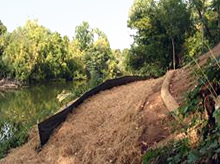
The Redding Rancheria Tribe in Redding, California successfully closed a 300 square yard dump along a stream bank of Clear Creek near the Sacramento River, using both tribal funds and EPA grant funding. Extensive hand-labor was used to remove large quantities of scrap metal, white goods, miscellaneous containers, and other scrap metals. By removing the debris by hand, the Tribe was able to preserve the natural soils and maintain the integrity of the hillside landscape, as well as prevent further contamination of Clear Creek. Approximately 2.29 tons of mixed garbage was removed and 12,430 pounds of metal was removed and recycled. Invasive vegetation that grew along the hillside was also removed and composted. Currently, the hillside is being restored by the growth of native grasses and wildflowers.
Pinoleville Transforms Trash
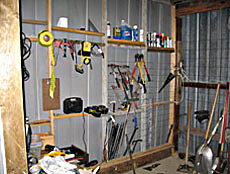
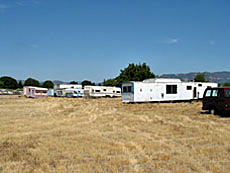
The Environmental Department of the Pinoleville Pomo Nation in Ukiah, California has found new uses for abandoned trailers, transforming a field of trailers on the Pinoleville Tribal Lands into a tool shed. The shed uses the tin from the trailers for the walls and wire fencing recovered from a dumpsite to hold the tools. The only purchased material in shed is the roofing material. Future trash-transformation projects include constructing a ramp out of abandoned tires; building a greenhouse using abandoned trailer trusses; and using recovered bathtubs and sinks to hold potting soil and plants in the greenhouse.
Fort Independence Reservation Reduces Waste by 26% through Recycling
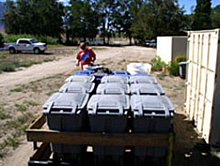
Fort Independence Indian Reservation in Owens Valley, California has built a successful, nationally recognized solid waste program from the ground up with Tribal leadership and grant support from U.S. EPA Region 9’s Office of Pollution Prevention and Solid Waste and the General Assistance Program. With EPA’s assistance, Fort Independence pioneered a weekly curbside trash and recycling collection service, developed an environmentally preferable purchasing policy for its tribal offices, produced public service announcements, and created a Solid Waste Ordinance to safeguard the Tribe’s natural resources.
Full Independence Reservation story
Torres Martinez Collaborative
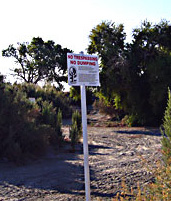
Joined by federal, state and local agencies, the U.S. Environmental Protection Agency and the Torres Martinez Tribe announced in October 2006, a multi-agency agreement to clean up dumps and clamp down on illegal dumping at the Torres Martinez Reservation.
The EPA provided $265,000 to Tribal Chairman Ray Torres to support the Tribe's work in developing an environmental program. The Torres Martinez Collaborative includes 25 federal, tribal, state, and local agencies including Riverside County, California Integrated Waste Management, and the Bureau of Indian Affairs. The EPA and the Torres Martinez Tribe have accomplished a great deal over the last decade; the Tribe now has an active environmental program which has closed dumps, impounded vehicles caught dumping trash, and conducted public outreach on dumping.
Hoopa Valley Tribe’s Blake Apparatus Helps Clean Up Open Dumps
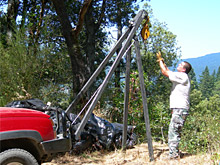
The system referred to as the “Blake Apparatus” enabled the crew of the Hoopa Tribal EPA to clean up 4 open dumps in 2006 with a substantially reduced work force. In FY 2006, a total of 44 tons of trash, appliances and scrap metal were removed from 8 acres of Reservation lands.
What normally would have cost as much as $2500 per site in contractor fees was instead reduced to just the cost of the 4 person TEPA staff to carry out the on ground clean up work. It also made the physical job of cleaning open dumps in steep, unstable terrain during the hot summer months much easier and less strenuous for the crew.
The Blake Apparatus was designed to operate off the front end of a pick-up truck with a winch powered cableway. It is a portable system that can be transported in the back of any pick up truck, set up in less than 10 minutes and operated by one person.
